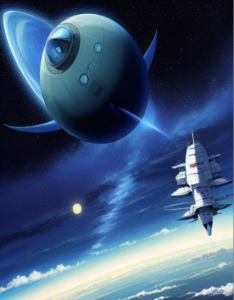 translated into English by Alex Woodward.
translated into English by Alex Woodward.
I guess I should start by attempting to summarize this story, but it’s just so weirdly — if not outright poorly — written (or perhaps translated? I’m sorry for throwing you under the bus here Mr Woodward but this story was just so bafflingly not good) that I don’t even know if I can do that with any level of professionalism. It starts out oddly, with what sounds like two people breaking into an astronaut-training facility. But then another astronaut who happens to have the same name as the author (eyeroll) shows up to take charge of their little mission, to explore a colony called Caspian Sea after his own return from another successful colony some light years away.
Space travel in the future has been greatly expedited by the discovery of wormhole travel, tho it’s still not entirely without its risks. The last mission to Caspian Sea, a primarily water planet, was thought to have failed due to the final transmissions sent by the astronauts sent there some decades ago. One of those astronauts, Yu Lan, was actually the love of He Xi’s life, the two having met in training and falling in love after her oxygen tank failed and he shared his breathing equipment with her (like that’s some sort of heroism and not, you know, basic shit you do when buddy diving.)
Anyway, He Xi leads Yelena and Fan Zhe through the wormhole to Caspian Sea, where they discover that the colony has not only survived but thrived. The genetically modified people that humans created to colonize the planet are flourishing, despite the lack of adherence to protocol. A suspicious He Xi quickly ferrets out that Yu Lan is still alive, and that she harbors a devastating secret that could destroy any connection between them for good.
So here’s the thing, this feels like someone trying really hard to mimic Liu Cixin’s potent mix of hard science and bravado and nihilism and “feminine softness”, and just… not succeeding. Like, I really enjoyed The Three-Body Problem and found myself liking The Dark Forest despite its problems, but Life Does Not Allow Us To Meet fell firmly in the horseshit territory of Death’s End. The hard science is unfailingly interesting but it’s like, do these authors have any female friends?! In fairness, Yu Lan is less of an idiot than DE’s Cheng Xin, but that’s a very low bar to clear.
As with the Remembrance Of Earth’s Past series, what really destroyed the believability of both those books and this novella for me is the bizarre insistence on nihilism over survival. The examples the author gives in this book of parent tribes being betrayed by their offspring make zero sense contextually: if that’s truly the fear, why colonize other planets at all?! Distance and culture are the main differences, anyway, in the historical examples given. Arguing genetics is just adding a different facet to the boiling xenophobia, and overall shows a failure to grasp the “softer” disciplines of anthropology and history.
What really snapped this reader’s patience was the alleged magnanimity at the end, which was just patriarchal bullshit masquerading as a love story. You can tell He Xi doesn’t even believe his own shit as he’s arguing with Yu Lan when she (idiotically) confides her secret in him. It felt so much as if the author was trying to shoehorn a sci-fi story into the framework of a classical poem, which is where the title comes from, but didn’t have skill or imagination enough to make it work.
Anyway, I hated this. One more novella to go and then I can go vote for this category in the 2024 Hugos. Oh, and Idk where you can buy this, but you probably shouldn’t. It’s regressive nonsense that would make even the male chauvinist sci-fi heroes of the mid 20th century cringe.
